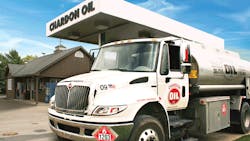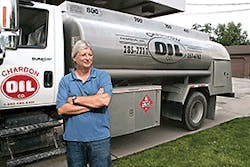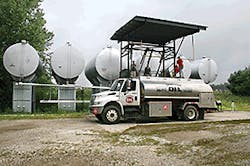Petroleum marketer gets costly lesson in picking the wrong pump for a tankwagon
DAVE Lawler of Tank Truck Service & Sales Inc and Gary Bulzan of Chardon Oil tried a knockoff brand of pump awhile back, and they’ll never do it again. It was a costly mistake.
Lawler is president of Tank Truck Service & Sales Inc, which is headquartered in Warren, Michigan. His company is a third-generation, family-owned business that was founded in 1947 by Lawler’s grandfather, Harold, and operated for many years by his father, James, who remains active in the operation.
In nearly 70 years, it has grown from a one-bay repair shop into a multi-state manufacturer, assembler and distributor of tank trucks and trailers of all types, most of which are used to haul gasoline and fuel oil for distributors that operate in the states of Michigan, Ohio, Indiana, and Pennsylvania.
One of Lawler’s good customers is Chardon Oil, which is owned by Bulzan and located in Chardon, Ohio, about 35 miles northeast of Cleveland. Since 1981, Chardon Oil has been delivering home heating oil, gasoline, and motor oils to a traditional customer base that covers northeastern Ohio and stretches into western Pennsylvania, along with kerosene and mineral oils to the many Amish communities that can be found in the region. In addition, Chardon Oil operates two gasoline stations to which it supplies product.
In 2010, Bulzan let Lawler know that he wanted to purchase a new delivery truck—and Lawler made a fateful decision.
“We were putting together a new tank for a good friend of ours, Gary Bulzan, and we tried an off-brand pump,” said Lawler. “We had been using Blackmer pumps for years, since the 1940s and 1950s, but we strayed away from them to try an off-brand pump this one time.”
Said Bulzan, “We were buying a new unit from Dave and, I don’t remember exactly, but they were offering something, maybe different pricing, and he wanted me to try some new pumps.”
So Bulzan took delivery of the new unit, which had a dual-pump system that featured pumps that claimed to be the equal of the TX Series sliding vane pumps that Blackmer has been supplying to the transport industry for many decades.
“We had no issues with the pump for about three years until it went out all of a sudden,” Bulzan said. “It was a catastrophic failure. I was making a delivery and it just quit and leaked all over the place.”
The pump was not only leaking, when it was taken apart, “it was totally destroyed,” according to Lawler. To make matters worse, the pump’s three-year warranty had just expired and the manufacturer was unwilling to supply a replacement.
“It was right after warranty and the manufacturer said we could get repair parts for no charge, but when we told them it was totally destroyed and we needed a new pump, they would not replace it since it was off-warranty, so we did not want to recommend a new off-brand pump to Gary and Chardon Oil,” Lawler said.
“We were just a couple months out of warranty, not very long, and we both thought we should get something from the other brand, but they told Dave flat out, ‘No,’ ” Bulzan said.
So Lawler delivered to Chardon Oil, free of charge, a tried-and-true alternative—a Blackmer TXD2.5 (2.5-inch) model sliding vane pump.
“The TX is the industry standard and just a great, great, great piece of equipment,” Lawler said. “They’ve had no problems since we put the new TX pump on and I wouldn’t anticipate having any for years and years and years to come.”
Blackmer has designed its TX Series pumps to be the best option for handling liquid petroleum products, such as gasoline, fuel oil, diesel, kerosene, and light lube oils. TX pumps feature cast-iron construction and operate via Blackmer’s unique sliding vane method that self-adjusts for wear to maintain flow rates. The result is a pump that offers excellent self-priming and dry-run capabilities, and easy maintenance.
Other design benefits include a dual-ended shaft on the two-, 2.5- and three-inch models that simplifies installation, mechanical seals and ball-bearing construction, symmetrical bearing support for even loading and wear, adjustable relief valve that protects against excessive pressures, and external ball bearings that are isolated from the pumpage to maximize bearing life and minimize contamination risk.
“We’ve been using Blackmer pumps since the early 1980s and we had never had any issue like we had with the other brand; Blackmer pumps last,” Bulzan said. “We probably get eight to 10 years out of them without a problem. If one were to go that quickly, I’m sure I would have remembered it.”
The second pump on the affected truck is still the TX knockoff model, but Lawler anticipates that won’t be the case for long.
“The other off-brand doesn’t get nearly the use, but we’ve decided that at the first sign of trouble we’ll get rid of that pump and put on a Blackmer,” he said.
For Lawler, there is also one more major benefit to recommending Blackmer pumps for his customers.
“US–made is a big deal for us, as well,” he said. “With the other one the castings were made offshore and we want to keep as much business as possible as we can in Michigan because we’re a Michigan company and Blackmer is a Michigan company. For me, it’s Michigan first, then the US, then, who cares?”
“Blackmer TX pumps are very reliable, dependable and all we need to do on them is basic maintenance,” Bulzan said.
In the end, Bulzan has a new bottom line when it comes to choosing transport pumps: “We’re done with trying the other ones.” ♦



